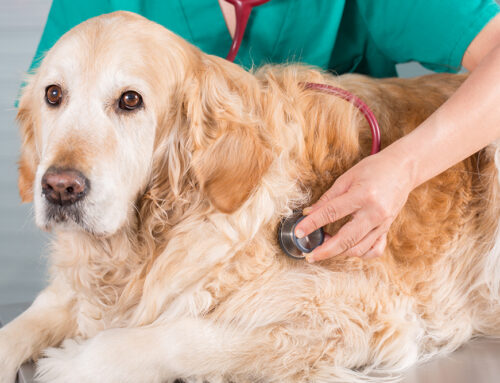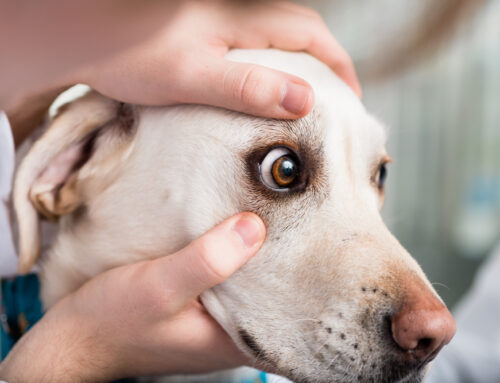Coughing, Gagging, or Wheezing? When to Seek Emergency Care for Kennel Cough
Why is my dog coughing all night? It could be more than just a tickle in the throat. Kennel cough- a highly contagious respiratory infection- spreads easily through the air, shared toys, or even a quick drink from another dog’s water bowl. While many dogs experience mild illness, others develop serious complications that require urgent or advanced care, especially puppies, seniors, and dogs with heart or immune-related conditions.
At Southern Arizona Veterinary Specialty & Emergency Center, our team is equipped to diagnose and treat complex respiratory illnesses and their complications. As a locally owned, AAHA-accredited emergency hospital, we provide 24/7 critical care and advanced diagnostics for dogs experiencing persistent cough, breathing difficulty, or pneumonia. Whether your pet needs same-day evaluation or hospitalization for oxygen therapy, we’re here when every minute counts.
What Dog Owners Need to Know About Canine Infectious Respiratory Disease
That harsh, honking cough that appears after boarding or a trip to the dog park is a hallmark of canine infectious respiratory disease complex (CIRDC). Despite the name, “kennel cough” doesn’t only happen in kennels. It spreads anywhere dogs congregate- training classes, grooming salons, veterinary lobbies, and even sidewalks where friendly nose-to-nose greetings occur.
CIRDC includes multiple viral and bacterial organisms that travel in droplets expelled by coughing, sneezing, or barking. Shared bowls, toys, and surfaces can stay infectious for hours or days. Dogs often shed bacteria before showing symptoms, which is why outbreaks spread so easily.
Crowded, poorly ventilated spaces and stress from travel or boarding can weaken a dog’s immune system, allowing mild infections to worsen. Vaccinated dogs are still susceptible to mild illness but typically experience shorter and less severe infections.
Recognizing the Telltale Signs of Kennel Cough
Most dogs develop a dry, hacking cough that sounds like honking or gagging. The cough often worsens with excitement, exercise, or collar pressure on the neck. Some pets retch at the end of coughing fits and may bring up white foam or mucus.
Common signs include:
- Persistent, harsh cough
- Gagging or retching without vomiting
- Mild nasal discharge or watery eyes
- Decreased energy or appetite
- Occasional low-grade fever
While mild cases are uncomfortable, not dangerous, others can escalate quickly. Respiratory distress in pets is a true emergency. If your dog is breathing rapidly at rest, using abdominal effort to breathe, or showing blue or pale gums, seek care immediately at our 24/7 emergency center. Early intervention prevents complications like airway collapse or pneumonia.
Why Vaccinated Dogs Can Still Cough
Kennel cough isn’t caused by a single germ. Bordetella bronchiseptica is a leading bacterial culprit and the target of most vaccines, but viral agents such as canine parainfluenza virus and canine adenovirus type 2 also play a role. Co-infections are common, and the combined effect can cause more severe illness.
Vaccines significantly reduce the risk of serious disease but cannot protect against every strain. Stress, exposure intensity, and underlying illness influence how sick a dog becomes. That’s why prompt evaluation is crucial for any coughing pet who seems weak, lethargic, or short of breath.
How Easily Does Kennel Cough Spread?
Transmission happens fast. A single infected dog at daycare or a dog park can expose dozens of others within hours. Dogs remain contagious through the coughing phase and for up to two weeks afterward.
To protect others: isolate coughing dogs, use separate food and water bowls, wash hands after handling, and disinfect shared surfaces and bedding. Good airflow and sunlight reduce viral survival, while frequent cleaning prevents recontamination.
If you have multiple dogs, monitor all pets for coughing or nasal discharge, and contact your veterinarian if symptoms develop. Our emergency team can advise whether home care is appropriate or if immediate evaluation is needed.
When You Should Worry About Complications
Most dogs recover within one to three weeks, but certain warning signs indicate the infection is spreading deeper into the lungs or affecting other organs.
Pneumonia is the most serious concern and may require hospitalization, IV antibiotics, and oxygen therapy. Dog pneumonia causes fever, lethargy, poor appetite, and difficulty breathing. Coughing may become moist or produce thick mucus. Dogs with chronic respiratory disease, immune compromise, or heart conditions are at higher risk for severe complications.
Other conditions can mimic kennel cough. Collapsed trachea in dogs produces a honking cough but requires different management. Heart disease can also cause coughing and difficulty breathing (dyspnea), which often worsens at night or when lying down. Because symptoms overlap, advanced imaging and oxygen monitoring may be necessary to identify the true cause and guide treatment.
How Veterinarians Diagnose Respiratory Infections
Diagnosis begins with history and a detailed physical exam, including listening to the chest and palpating the trachea for sensitivity. In mild, straightforward cases, this may be all that’s needed.
When coughing persists or breathing becomes labored, further evaluation helps rule out serious disease. Chest radiographs identify pneumonia, fluid buildup, or airway collapse. PCR testing can pinpoint the infectious agent, guiding treatment and isolation protocols. Bloodwork checks for systemic infection or underlying conditions that make recovery harder.
At Southern Arizona Veterinary Specialty & Emergency Center, advanced imaging and on-site lab capabilities allow rapid diagnosis, helping our team stabilize critical patients quickly and determine the most effective treatment plan.
Effective Treatment Approaches
Mild kennel cough often resolves with rest and supportive care, but dogs with fever, appetite loss, or increased breathing effort require closer supervision. Keep exercise minimal, use a harness instead of a collar, and provide humidified air to ease throat irritation. A cool-mist humidifier or brief time in a steamy bathroom can help loosen mucus.
Veterinarians may prescribe cough suppressants to reduce irritation and allow rest. Anti-inflammatory medications relieve swelling in the airways. Antibiotics are reserved for confirmed bacterial infections or cases progressing toward pneumonia. For more advanced cases, hospitalization may include IV fluids, nebulization treatments, oxygen therapy, and continuous monitoring to prevent respiratory failure.
Follow-up exams are important, especially if the cough lasts longer than three weeks or worsens after initial improvement. Persistent coughing can indicate unresolved infection, secondary inflammation, or a structural problem requiring imaging or endoscopy.
Contagious shedding can continue for seven to fourteen days after coughing stops. Your veterinarian will advise when it’s safe to return to social settings. Gradually reintroduce normal activity, keeping walks calm and using a harness to avoid throat strain.
Prevention Through Vaccination and Smart Choices
Vaccinations for dogs are the cornerstone of prevention. The Bordetella vaccine- available as an injection, nasal spray, or oral dose- reduces symptom severity and duration. Many boarding and daycare facilities require boosters every six to twelve months. Core vaccines for parainfluenza and adenovirus type 2 add an additional layer of protection against CIRDC.
Plan ahead and schedule vaccination at least one to two weeks before boarding, training, or daycare. Choose facilities with strong ventilation and appropriate dog-to-staff ratios. Avoid crowded indoor events during local outbreaks, and keep vulnerable pets such as puppies and seniors away from high-risk settings.
Can Kennel Cough Affect Cats?
Yes. Bordetella bronchiseptica can infect cats, particularly in multi-pet households or shelter environments. Bordetella infection in cats typically causes sneezing, nasal discharge, and occasional coughing. If a dog in your home develops kennel cough, monitor cats closely and separate them until symptoms subside to prevent cross-infection.
Recognizing Emergencies and Knowing Where to Go
While most dogs recover uneventfully, a small percentage develop complications that require urgent care. Bring your pet to our 24/7 emergency hospital if you notice:
- Rapid or labored breathing
- Open-mouth breathing at rest
- Blue, purple, or pale gums
- Collapse or fainting
- Persistent high fever
- Refusal to eat or drink for more than 24 hours
- Severe coughing that causes vomiting or exhaustion
Respiratory distress in pets can progress quickly without oxygen support. For dogs with underlying airway abnormalities, our team can also coordinate advanced diagnostics and surgical intervention when structural repair is necessary.

Need Help Now?
At Southern Arizona Veterinary Specialty & Emergency Center, we provide comprehensive emergency and specialty-level care for pets experiencing respiratory illness, persistent cough, or complications like pneumonia. Whether your dog needs after-hours stabilization or advanced diagnostic imaging, our East Side location at 7474 E. Broadway Blvd, Tucson, offers emergency services 24/7.
If your dog recently developed a cough after boarding, daycare, or grooming, request an appointment for non-urgent cases- or come directly to our emergency service for immediate evaluation.








Leave A Comment